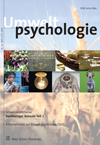Artikeldetails
 Antonietta Di Giulio, Rico Defila & Ruth Kaufmann-Hayoz (2010),
Antonietta Di Giulio, Rico Defila & Ruth Kaufmann-Hayoz (2010),Gutes Leben, Bedürfnisse und nachhaltiger Konsum.
Umweltpsychologie 14(2), 10-29.
Dieser Artikel wurde in deutsch verfasst.
| Zusammenfassung: | Der Beitrag ist eine reflexionsorientierte Klärung grundlegender Begriffe mit Blick auf die nähere Bestimmung und (empirische) Erfassung nachhaltigen Konsums. Diese Klärung geht vom Begriff der Nachhaltigkeit im Verständnis der Vereinten Nationen aus. Zuerst wird gezeigt, welchen Stellenwert die Frage nach dem guten Leben in diesem Nachhaltigkeitsverständnis einnimmt, und diskutiert, von welcher Auffassung des guten Lebens im Zusammenhang mit Nachhaltigkeit sinnvollerweise auszugehen ist. Es wird dafür argumentiert, vom 'Fähigkeiten-Ansatz', wie ihn z.B. Nussbaum definiert, auszugehen, da dieser Ansatz erlaubt, das gute Leben kultur- und zeitübergreifend zu fassen und das Ziel Nachhaltiger Entwicklung nicht auf das physische Überleben der Menschen zu reduzieren. Anschließend wird gezeigt, wie sich ein solcher Ansatz mit dem Bedürfnisbegriff verbinden lässt und was dabei gewonnen wird. Vor diesem Hintergrund wird ein integriertes System von Begriffen skizziert, das unterscheidet zwischen (a) objektiven Bedürfnissen, (b) subjektiven Wünschen, (c) dem Grad bzw. Umfang, in dem Bedürfnisse befriedigt werden, (d) den Mitteln, die zur Bedürfnisbefriedigung verwendet werden, und (e) den (natürlichen) Ressourcen und Ressourcenleistungen, die dafür genutzt werden. In einem nächsten Schritt wird gefragt, wie dieses Begriffssystem auf Konsum übertragen werden kann, wenn Konsum als die Inanspruchnahme von Gütern zur Befriedigung objektiver Bedürfnisse und subjektiver Wünsche verstanden wird. Da es fruchtbar scheint, im Kontext nachhaltigen Konsums so vorzugehen, werden zum Schluss die Fragen formuliert, die auf dem Weg zu einem entsprechend ausgearbeiteten integrierten Ansatz nun anstehen. |
| Schlagworte: | Bedürfnisse Konsum Lebensqualität Nachhaltigkeit Umwelteinstellungen |
| Abstract: | This is a conceptual paper aiming at the clarification several basic notions in view of an accurate determination and (empirical) capture of sustainable consumption. For our reflection we assume the concept of “Sustainable Development” as understood by the United Nations. We first show the significance of the question of “Good Life” within this concept of Sustainable Development, and we discuss the appropriate conception of Good Life in connection with sustainability. We argue for adopting the 'capability approach' as defined, e.g., by Nussbaum, since this approach allows to conceive Good Life independent from historical and cultural conditions, and to avoid reducing the goal of Sustainable Development to the physical survival of humans. We then show how such an approach can be connected to the notion of needs, and what can be gained by this. Against this background we outline an integrated system of concepts, distinguishing between (a) objective needs, (b) subjective wants, (c) the degree or amount of need satisfaction, (d) the means applied for the satisfaction of needs (satisfiers), and (e) the (natural) resources and resource services that are used hereby. In a next step we ask how this conceptual system can be transferred to the topic of consumption, defining consumption as the acquisition and use of goods for satisfying objective needs as well as subjective wants. As this appears to be promising in the context of sustainable consumption, we conclude by posing those questions that have to be dealt with when elaborating this integrated approach. |
| Keywords: | Consumption Environmental Attitudes Human Needs Quality Of Life Sustainability |
Zum Inhaltsverzeichnis

